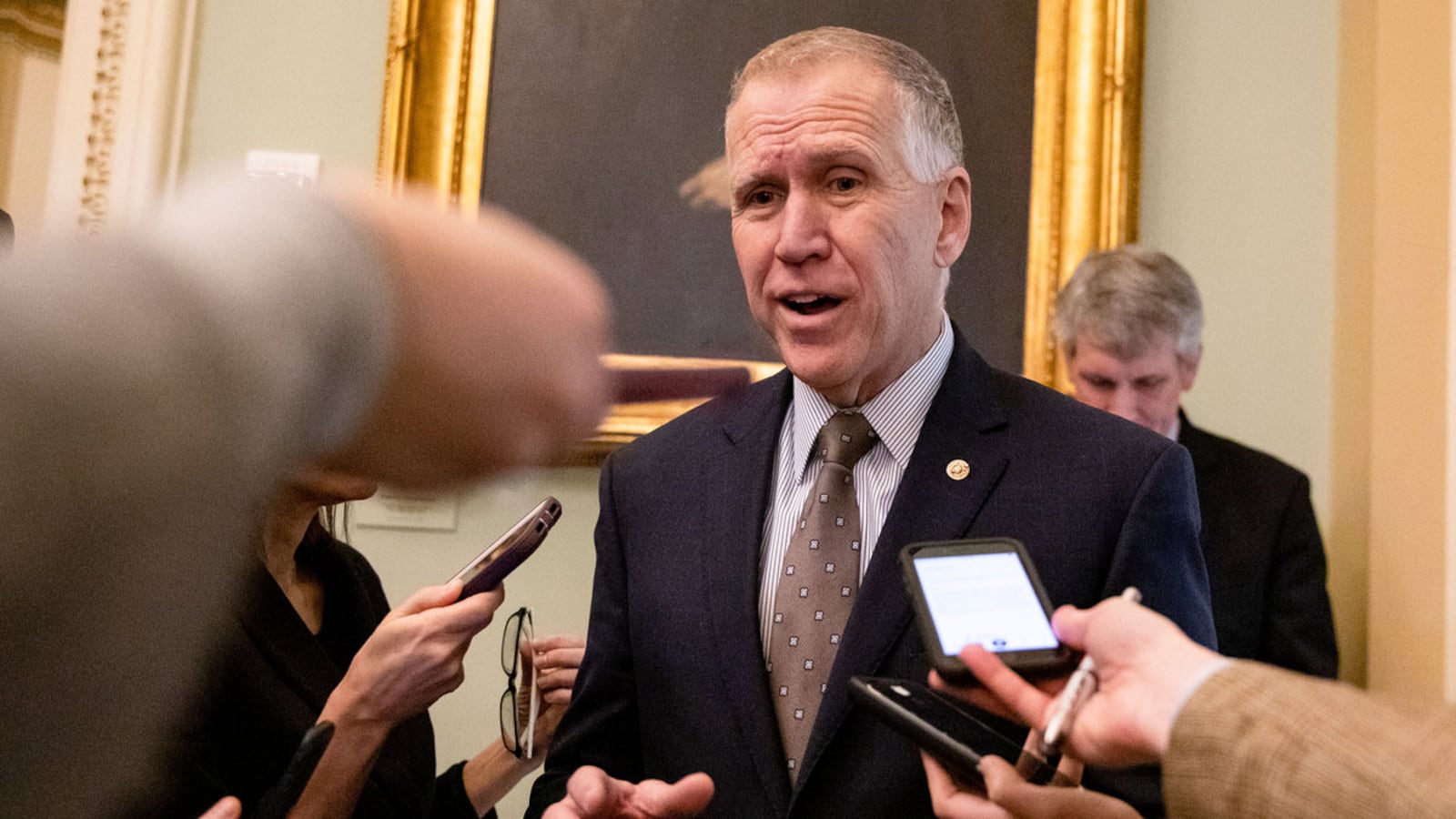Like many Republicans in office today, Sen. Thom Tillis (R-NC) came to power in the Barack Obama era by running against the president’s signature health-care law.
Today, those Republicans are confronting a difficult political environment in which their dogged efforts to kill the Affordable Care Act may have, in fact, made it more popular. And many are trying to whitewash their prior opposition.
Tillis is taking it a bit farther. The North Carolina Republican, who is facing a competitive re-election this fall, is now bragging that a health-care bill he wrote “literally” cribs language from Obamacare.
In a July 27 appearance on an Asheville, North Carolina, TV station, Tillis was asked about what plan Republicans have in place in the event that the Supreme Court strikes down Obamacare in a looming legal challenge. Tillis referenced the bill he co-wrote, called the PROTECT Act, which purports to safeguard the most popular elements of the law—chief among them its guarantee of health coverage for people with pre-existing conditions.
“Pre-existing conditions is critically important to protect,” said Tillis. “So, I introduced the bill—it literally took lines out of the Affordable Care Act. It says that we expect all insurers to recognize that pre-existing conditions are not a reason for declining health insurance.” Referencing another popular plank of the ACA that allows young people to stay on their parents’ health insurance plans, he added, “I think that we can make progress on young adults under the age of 26.”
The North Carolina Republican went on to note criticisms of the Affordable Care Act, arguing that it has “disrupted” the health-care system and that while it offered coverage to low-income people, that coverage has not always been affordable.
But his rush to associate himself with elements of Obamacare speaks to how seismically the politics of the law have changed in recent years, and how concerned Republicans are that Democrats might repeat their successful 2018 midterm strategy in 2020 by constantly telling voters that the GOP is working to undermine their health care. Tillis, after all, not only built his successful run for Senate—and his voting record there—on unequivocal, single-minded resistance to Obamacare; he once called the law a “cancer” on the U.S. economy.
“Republicans can read polls,” said Tom Miller, a fellow who studies health care at the American Enterprise Institute, a right-leaning think tank. “They have to make some gesture in having most people think they’ll get something if [the ACA] is gone… It’s a different environment. The problem Republicans have from the larger universe where they were in 2014, 2015—they’re running out of things they’re supposed to be opposed to in the ACA, but know they must be opposed to. It’s like a lingering habit.”
This fall, Tillis faces a challenge from Cal Cunningham, a Democratic former state lawmaker, in a contest that is shaping up to be one of the most hard-fought and expensive Senate races on the map. Cunningham outraised Tillis by $5 million in the most recent fundraising quarter and leads or ties him in a slew of recent polls. As Democrats eye North Carolina as a must-win race to reclaim their Senate majority, he has used health care as attack fodder against Tillis, running an ad in February telling the story of a North Carolina family who he says would be “bankrupt” without the ACA’s protections on pre-existing conditions.
When Tillis was first elected to this seat in 2014, he narrowly defeated incumbent Democratic Sen. Kay Hagan in a midterm election year during which, as Miller noted, Obamacare was a valuable political weapon for the GOP. Tillis frequently referred to Hagan as the “deciding vote” for Obamacare, a distinction that many GOP challengers stuck on Democratic senators after the law passed in 2009 with 60 votes, the exact threshold for passage. And the ACA was the focus of Tillis’ very first campaign ad. "Kay Hagan enabled President Obama's worst ideas,” he said in the spot. “She refuses to clean up his mess, so you and I have to clean up hers.”
“ObamaCare is a cancer on our national economy and it threatens the quality of every American's health care,” Tillis’ campaign website read in 2014. “ObamaCare is ridden with policies that are bad for families, bad for seniors, bad for businesses, and bad for the economy. Thom will fight in the Senate for full repeal of ObamaCare, for defunding ObamaCare, and he will work to implement private sector solutions to reduce healthcare costs for North Carolinians.”
After defeating Hagan, Tillis worked to make good on those promises. During his first term in the Senate, he has voted on 15 separate occasions for resolutions to repeal the entirety of Obamacare or parts of it, or on vehicles to set up such votes. In 2017, he supported the GOP’s first real effort to repeal and replace the ACA after Donald Trump became president, voting in favor of all three legislative proposals that would have done away with the law that July.
During that fight, Tillis warned against accepting Obamacare and building on it—something that his current effort implicitly does. “Trying to fix health care with the Obamacare provisions and the regulatory framework in place—that gives leverage to a failed framework,” said Tillis on a talk radio show in 2017. “There are people, even friends of mine, who say, ‘give up’... We can’t afford to.”
In that interview, Tillis also vowed to vote for repeal “every time it comes to the floor” and called it “foundational to a promise we made to the American people.”
That effort, of course, failed, and Republicans became resigned to living with Obamacare after Democrats took control of the House in 2018.
Asked by The Daily Beast if the senator’s embrace of planks of Obamacare is consistent with his past stances against using the “underpinnings” and “framework” of the law, a Tillis campaign spokesperson did not respond.
The legislation that Tillis is now touting addresses several planks of the ACA that are threatened by the case currently before the Supreme Court, Texas v. California, in which a group of GOP-led states are arguing that the ACA’s individual mandate to purchase insurance is unconstitutional.
Introduced last year, the PROTECT Act would prohibit insurance companies from denying coverage to people on the basis of pre-existing conditions, and would also prohibit them from charging certain populations higher premiums. Many of Tillis’ fellow endangered incumbents, such as Sens. Martha McSally (R-AZ), Joni Ernst (R-IA), and Steve Daines (R-MT) have co-sponsored the law and have pointed to it on the campaign trail as proof that they are not in favor of gutting pre-existing conditions protections.
However, health care experts aligned with institutions around the political spectrum have largely panned the legislation as a “throat-clearing exercise,” as AEI’s Miller put it—a bill not seriously envisioned as a substantive stand-in for the ACA’s protections.
Several analysts have noted that the PROTECT Act contains major loopholes that would not contribute to meaningful coverage for those with pre-existing conditions.
“In most states, the Tillis bill likely would mean a return to pre-ACA insurer practices, with, for instance, women charged more than men for the same health plan and lifetime limits for tens of millions of people with employer coverage,” wrote Sarah Leuck, an analyst at the left-leaning Center for Budget and Policy Priorities, in an analysis published last year. “Under the bill, a person who has cancer technically could buy a plan and not be charged a higher premium due to the illness. However, his or her benefits could run out because the insurer imposes an annual or lifetime limit, or the plan might not cover the prescription medicines that treat the cancer.”







